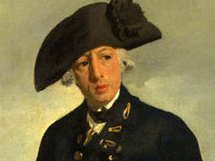10th July 2014
Westminster Abbey honours Australia’s first Governor

We assembled for a spectacular occasion in Westminster Abbey this week to celebrate Admiral Arthur Phillip RN, Captain of the First Fleet, and first governor of New South Wales. The Duke of Edinburgh inaugurated a plaque in Phillip’s honour in the central aisle of the Abbey, with cabinet ministers from both countries, the current Governors of New South Wales and Victoria, and many eminent people from Britain and Australia in attendance.

Phillip was a remarkable man. It is perhaps surprising that he has not received more recognition in his homeland until now. From humble origins, he became a skilled seaman and administrator and it is in no small part thanks to him that the small penal colony he established on the far side of the world has grown into one of the world’s most prosperous and successful societies. The background was not propitious: the fleet was under-resourced, the 250 day journey (via Brazil and South Africa) was long and arduous, and the site recommended by Captain Cook – Botany Bay – proved to have insufficient freshwater or good quality soil to sustain a settlement, forcing him to relocate to what we now know as Sydney’s magnificent harbour.
The first fleet consisted of 11 ships carrying around 800 convicts and 600 marines and sailors. At the Abbey I met proud living descendants of both groups. Thanks to Phillip’s meticulous focus on hygiene and nutrition, only a few dozen were lost on the journey: massively fewer than on subsequent transportations. Phillip was determined to establish a self-sustaining settlement where convicts could earn their freedom and stay on. He laid out ambitious city plans and encouraged the convicts to farm and build.
Of course the arrival of the western settlers had a devastating impact on the indigenous peoples. For some that has coloured their thinking about the First Fleet. But Phillip himself sought peaceful co-existence with the aboriginal Australians he encountered and strove to understand their language and learn from their understanding of the local environment. Certainly it is true that Australia would not be what it is today without Arthur Phillip, and he deserves the title of father of modern Australia.
Also in town for the celebrations were the Australian Cook Society, hosted by their British counterparts. We gave them a briefing at the Foreign Office and at a big dinner at the historic Trinity House in the City, I read out a message from PM David Cameron congratulating them on their 45th anniversary.